WORKING
8 STEPS OF REPENTANCE
“Blessed
is the man unto whom the LORD imputeth not iniquity, and in whose
spirit there is no guile” (Psalms
32:2).
"From that time Jesus began to preach, and to say, Repent: for the kingdom of heaven is at hand" (Matthew 4:17).
Jesus
taught His disciples how to pray (Matthew 6:9); did He not also tell
them how to repent? He considered it very important because His
ministry message was “Repent for the Kingdom of Heaven is
approaching” (Matthew 4:17, ERRB).
WORKS.
“Works”
can refer
to any deeds
(e.g.,
works of the flesh, Galatians 5:19).
In the
context of
Romans 4:1-8 the
Spirit's
argument is
that God's grace is not
given because of a person's works
that
pertain
“to the flesh”
(verse 1).
God's
favor (grace)
is available to ones who like
Abraham believe
God's promises (the
context in
Genesis 15:6). Belief
is defined as a
work
from the
heart (Romans 10:10), not
the flesh. It
is a work
of God (John 6:28,29).
The fleshly works
referred to in Romans 4 is not talking about the works authorized by
God.
God's
“favor”i
(grace)
is available to ones who
repent of
their
works of the flesh
like
King David did
(quoted
from Psalm
32). Repentance is a
work
required of
the spirit
of man (Psalms 32:2;
compare to 2
Corinthians 7:10's
“working repentance”).
Like “belief”,
is it not a work of God?
In Psalms 32 David pictures
repentance as a beatitude. This single beatitude compares to the
eight “Beatitudes” of Jesus in Matthew 5. Those
Beatitudes are an example of Jesus' preaching which was “repentance”
(Matthew 4:17). Both
Jesus and David begin with “Blessed is the man”
(Psalms 32:2) and Jesus describes what I suggest for our purpose are
eight steps of godly repentance (2 Corinthians 7:9).
DEFINITIONS.
The English meaning of beatitudeii
is “Supreme blessedness or happiness.” The word “repent”
means to “think differently; i.e., reconsider morally;
compunction; reversal.” In the “Beatitudes”,
Jesus gives the steps graphically of acceptable repentance. It is
similar to viewing a series of progressive movie clips.
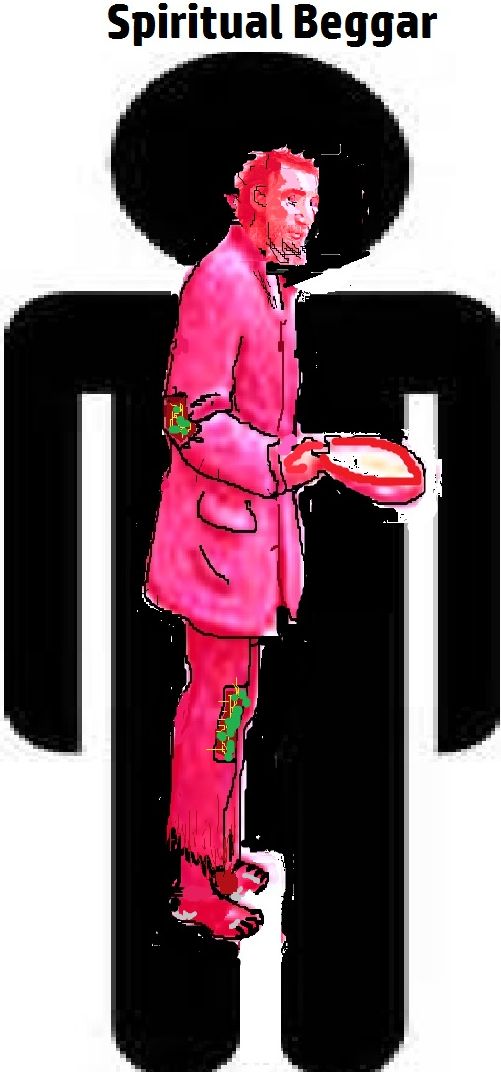 STEP 1.
ACKNOWLEDGING ONESELF
A SPIRITUAL BEGGAR.
First, David recognized that he was destitute and a spiritual
beggar. David said, “When I kept silence, my bones waxed
old through my roaring all the day long.” Jesus said,
“Blessed are the poor in spirit: for
theirs is the kingdom of heaven” (Matthew 5:3). “Poor
in spirit” is “ptōssōG4434
“one that crouches; a beggar (as cringing); a pauper”
(Strong's). Jesus uses a key word of hope for the repentant
ones with the word “blessed.” Blessed or “happiness”
is “for” (hoti G3754 ,
Strong's: “causatively because”).
It is not that such a state as poverty in spirit is ideal.
David certainly clarifies that. The point is that there is hope
offered by our Loving God in Jesus' Kingdom (reign) of Heaven!
That's where the happiness is to be found.
STEP 1.
ACKNOWLEDGING ONESELF
A SPIRITUAL BEGGAR.
First, David recognized that he was destitute and a spiritual
beggar. David said, “When I kept silence, my bones waxed
old through my roaring all the day long.” Jesus said,
“Blessed are the poor in spirit: for
theirs is the kingdom of heaven” (Matthew 5:3). “Poor
in spirit” is “ptōssōG4434
“one that crouches; a beggar (as cringing); a pauper”
(Strong's). Jesus uses a key word of hope for the repentant
ones with the word “blessed.” Blessed or “happiness”
is “for” (hoti G3754 ,
Strong's: “causatively because”).
It is not that such a state as poverty in spirit is ideal.
David certainly clarifies that. The point is that there is hope
offered by our Loving God in Jesus' Kingdom (reign) of Heaven!
That's where the happiness is to be found.
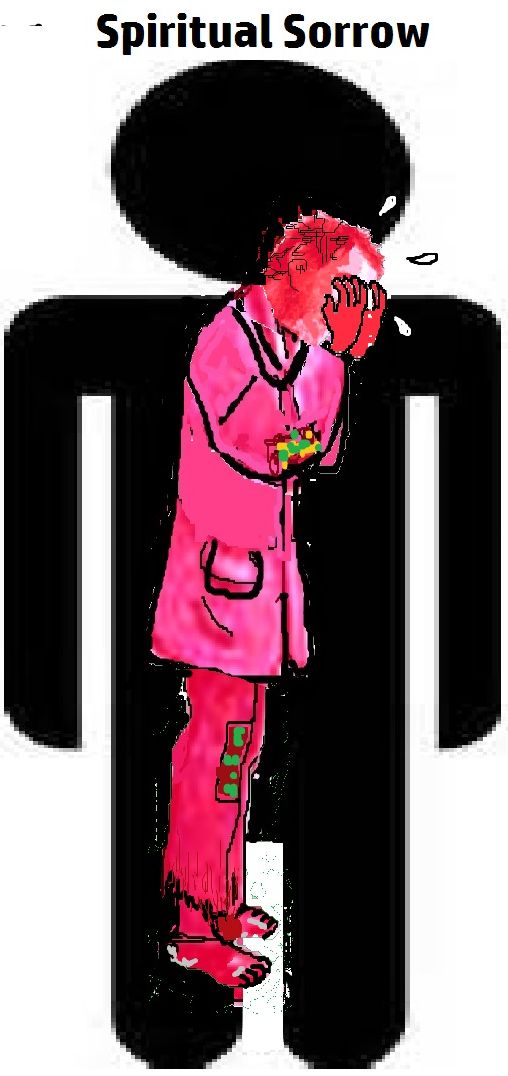
STEP 2.
BEING
SORRY FOR YOUR SINS. “Blessed are they
that mourn” (v.4). A sinner must be really sorry for his
spiritual poverty. “Mourn” is “pentheoG3996,
to grieve” for his condition.
“For godly sorrow worketh repentance unto salvation,
a repentance which bringeth no regret” (2 Corinthians 7:10.
RV). The “sorrow” here means “of persons
mourning.” This sorrow fully works repentance that saves and
will bring gladness. David, likewise, suffered from the terrors of
remorse: “many sorrows shall be to the wicked” (10).
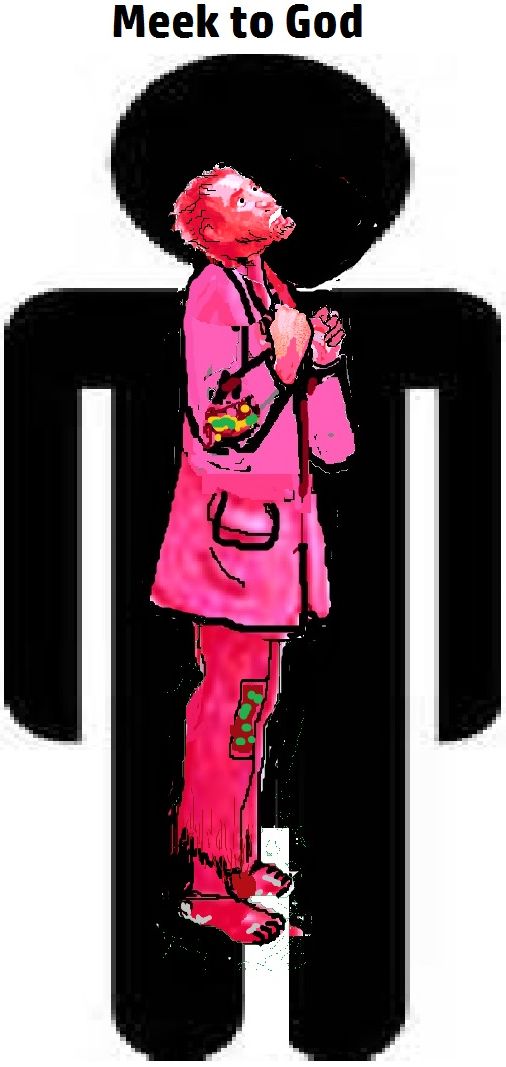 STEP 3.
BEING
MEEK. Third, he must humble himself before God
Almighty. Blessed are the meek (v.5). “Meek”
is literally “mild”; Strong says the word implies
humility. Both Moses (Numbers 12:3) and Jesus (Matthew 11:29) were
meek. Moses is said to be meek in his reaction in a context where
his siblings were unfairly attacking and criticizing him. Moses is
said to be meek because he submitted to the judgment of God. So it
is then, that the one that would “inherit the earth” is
the one who submits to the judgment of God. “The LORD
lifteth up the meek” (Psalm 147:6). David also humbly
faces God: he acknowledges that it is God's hand against him: “For
day and night thy hand was heavy upon me; I acknowledged my sin unto
thee, and mine iniquity have I not hid” (32:4).
STEP 3.
BEING
MEEK. Third, he must humble himself before God
Almighty. Blessed are the meek (v.5). “Meek”
is literally “mild”; Strong says the word implies
humility. Both Moses (Numbers 12:3) and Jesus (Matthew 11:29) were
meek. Moses is said to be meek in his reaction in a context where
his siblings were unfairly attacking and criticizing him. Moses is
said to be meek because he submitted to the judgment of God. So it
is then, that the one that would “inherit the earth” is
the one who submits to the judgment of God. “The LORD
lifteth up the meek” (Psalm 147:6). David also humbly
faces God: he acknowledges that it is God's hand against him: “For
day and night thy hand was heavy upon me; I acknowledged my sin unto
thee, and mine iniquity have I not hid” (32:4).
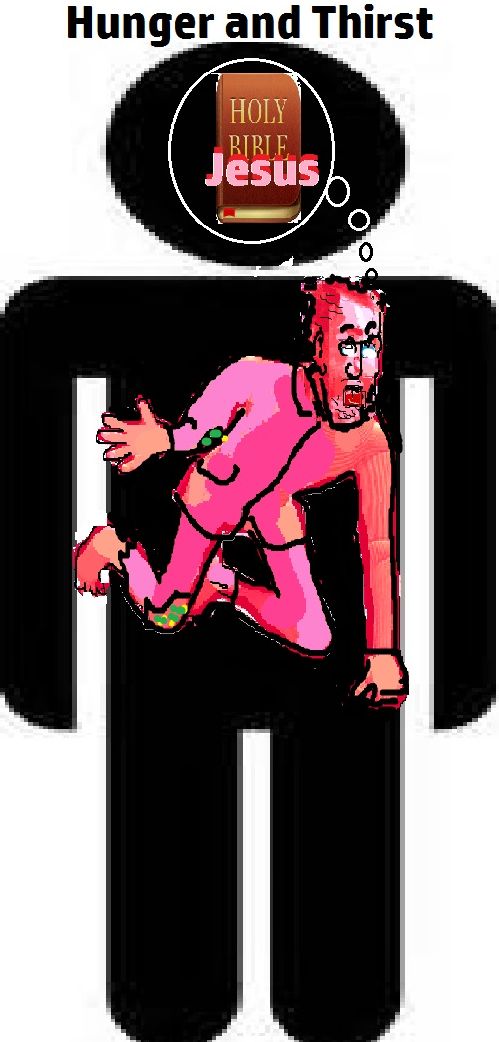
STEP 4.
HUNGERING AND THIRSTING.
Fourth, “Blessed are they which do hunger and thirst after
righteousness” (v.6). The food is the bread and water for
the soul. David hungered
and thirsted for his “strength was dried up as by the heat
of summer” (v. 4). Jesus
told the woman at the well
(John 4:14) that He had the
gift of God: living water.
Again, in John 6:35, Jesus
identified Himself as the bread of life, and one that believes on Him
shall never thirst.
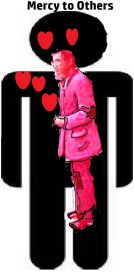 STEP 5.
MERCIFUL. Fifth, he must behave towards others as
he asks God to behave for him. “Blessed are the merciful:
for they shall obtain mercy“ (v. 7). Moses cried to God
for mercy for his siblings, especially his sister who became leprous.
Parable of the ungrateful steward in Matthew 18:21f tells of God
punishing an unforgiving servant who had just received mercy himself.
Jesus teaches us to pray, “Father, forgive us our debts as
we forgive our debtors” (Matthew 6:12-14).
STEP 5.
MERCIFUL. Fifth, he must behave towards others as
he asks God to behave for him. “Blessed are the merciful:
for they shall obtain mercy“ (v. 7). Moses cried to God
for mercy for his siblings, especially his sister who became leprous.
Parable of the ungrateful steward in Matthew 18:21f tells of God
punishing an unforgiving servant who had just received mercy himself.
Jesus teaches us to pray, “Father, forgive us our debts as
we forgive our debtors” (Matthew 6:12-14).
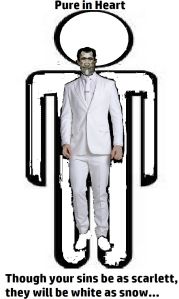 STEP 6.
CLEANSING. Sixth, cleansing must be in the heart.
“Blessed are the pure in heart” (v. 8). David
confesses and renunciates his sin and is cleansed. “Thou
forgavest the iniquity of my sin.” He does not mention the
required Mosaic atonement sacrifices here, although he does in other
Psalms. Our atonement is through the blood of Jesus (1 John 1:9).
“And almost all things are by the law purged with blood; and
without shedding of
blood is no remission”
(Hebrews 9:22). The only religion today that provides this is
Christianity. “Repent and be baptized [in water] everyone of
you and you shall receive the gift of the Holy Spirit” (Acts
2:38). One is cleansed by water by the Word (Ephesians 5:26).
STEP 6.
CLEANSING. Sixth, cleansing must be in the heart.
“Blessed are the pure in heart” (v. 8). David
confesses and renunciates his sin and is cleansed. “Thou
forgavest the iniquity of my sin.” He does not mention the
required Mosaic atonement sacrifices here, although he does in other
Psalms. Our atonement is through the blood of Jesus (1 John 1:9).
“And almost all things are by the law purged with blood; and
without shedding of
blood is no remission”
(Hebrews 9:22). The only religion today that provides this is
Christianity. “Repent and be baptized [in water] everyone of
you and you shall receive the gift of the Holy Spirit” (Acts
2:38). One is cleansed by water by the Word (Ephesians 5:26).
 STEP 7.
PEACEMAKER.
Seventh, makers
of peace between men confirm the peace with God. “Blessed
are the peacemakers: for they shall be called the children of God”
(v. 9). The
penitent, according to Jesus, will
promote
peace. What better way than to do
that than to give
the “good news” of the existing Kingdom? “How
beautiful are the feet of them that preach the gospel of peace”
(Romans 10:15). David
appears to also
“instruct
and teach
the way one should go”
(v. 8).
STEP 7.
PEACEMAKER.
Seventh, makers
of peace between men confirm the peace with God. “Blessed
are the peacemakers: for they shall be called the children of God”
(v. 9). The
penitent, according to Jesus, will
promote
peace. What better way than to do
that than to give
the “good news” of the existing Kingdom? “How
beautiful are the feet of them that preach the gospel of peace”
(Romans 10:15). David
appears to also
“instruct
and teach
the way one should go”
(v. 8).
STEP 8.
PERSECUTION.
Eighth, persecution is promised but as a blessing for
pleasing God. Blessed are they which are persecuted for
righteousness' sake: for theirs is the kingdom of heaven (v.10).
“Rejoice, and be exceeding glad: for great is your reward in
heaven” (5:12). The repentant David proclaims, “Rejoice,
ye righteous: and shout for joy, all ye that are upright in heart”
(11).
Repentance is required for
entry into the Kingdom. The 3000 souls on the Day of Pentecost
were told to “repent” after believing (“pricked in
their hearts”) and before being baptized (Acts 2:37,38).
Repentance is required in our daily walk. We are told to walk
in the Light as Jesus is in the Light and to acknowledge one's sins
regularly (like David did) and God will continuously cleanse with the
sacrificial blood of Jesus (1 John 1:7-9).
Gaylon West
"Throw Out the Lifeline"
http://www.BibleStudyLesssons.net
iApostolic
Bible Polyglot- English.
ii
dictionary.search.yahoo.com
 STEP 1.
ACKNOWLEDGING ONESELF
A SPIRITUAL BEGGAR.
First, David recognized that he was destitute and a spiritual
beggar. David said, “When I kept silence, my bones waxed
old through my roaring all the day long.” Jesus said,
“Blessed are the poor in spirit: for
theirs is the kingdom of heaven” (Matthew 5:3). “Poor
in spirit” is “ptōssōG4434
“one that crouches; a beggar (as cringing); a pauper”
(Strong's). Jesus uses a key word of hope for the repentant
ones with the word “blessed.” Blessed or “happiness”
is “for” (hoti G3754 ,
Strong's: “causatively because”).
It is not that such a state as poverty in spirit is ideal.
David certainly clarifies that. The point is that there is hope
offered by our Loving God in Jesus' Kingdom (reign) of Heaven!
That's where the happiness is to be found.
STEP 1.
ACKNOWLEDGING ONESELF
A SPIRITUAL BEGGAR.
First, David recognized that he was destitute and a spiritual
beggar. David said, “When I kept silence, my bones waxed
old through my roaring all the day long.” Jesus said,
“Blessed are the poor in spirit: for
theirs is the kingdom of heaven” (Matthew 5:3). “Poor
in spirit” is “ptōssōG4434
“one that crouches; a beggar (as cringing); a pauper”
(Strong's). Jesus uses a key word of hope for the repentant
ones with the word “blessed.” Blessed or “happiness”
is “for” (hoti G3754 ,
Strong's: “causatively because”).
It is not that such a state as poverty in spirit is ideal.
David certainly clarifies that. The point is that there is hope
offered by our Loving God in Jesus' Kingdom (reign) of Heaven!
That's where the happiness is to be found.

 STEP 3.
BEING
MEEK. Third, he must humble himself before God
Almighty. Blessed are the meek (v.5). “Meek”
is literally “mild”; Strong says the word implies
humility. Both Moses (Numbers 12:3) and Jesus (Matthew 11:29) were
meek. Moses is said to be meek in his reaction in a context where
his siblings were unfairly attacking and criticizing him. Moses is
said to be meek because he submitted to the judgment of God. So it
is then, that the one that would “inherit the earth” is
the one who submits to the judgment of God. “The LORD
lifteth up the meek” (Psalm 147:6). David also humbly
faces God: he acknowledges that it is God's hand against him: “For
day and night thy hand was heavy upon me; I acknowledged my sin unto
thee, and mine iniquity have I not hid” (32:4).
STEP 3.
BEING
MEEK. Third, he must humble himself before God
Almighty. Blessed are the meek (v.5). “Meek”
is literally “mild”; Strong says the word implies
humility. Both Moses (Numbers 12:3) and Jesus (Matthew 11:29) were
meek. Moses is said to be meek in his reaction in a context where
his siblings were unfairly attacking and criticizing him. Moses is
said to be meek because he submitted to the judgment of God. So it
is then, that the one that would “inherit the earth” is
the one who submits to the judgment of God. “The LORD
lifteth up the meek” (Psalm 147:6). David also humbly
faces God: he acknowledges that it is God's hand against him: “For
day and night thy hand was heavy upon me; I acknowledged my sin unto
thee, and mine iniquity have I not hid” (32:4).
 STEP 5.
MERCIFUL. Fifth, he must behave towards others as
he asks God to behave for him. “Blessed are the merciful:
for they shall obtain mercy“ (v. 7). Moses cried to God
for mercy for his siblings, especially his sister who became leprous.
Parable of the ungrateful steward in Matthew 18:21f tells of God
punishing an unforgiving servant who had just received mercy himself.
Jesus teaches us to pray, “Father, forgive us our debts as
we forgive our debtors” (Matthew 6:12-14).
STEP 5.
MERCIFUL. Fifth, he must behave towards others as
he asks God to behave for him. “Blessed are the merciful:
for they shall obtain mercy“ (v. 7). Moses cried to God
for mercy for his siblings, especially his sister who became leprous.
Parable of the ungrateful steward in Matthew 18:21f tells of God
punishing an unforgiving servant who had just received mercy himself.
Jesus teaches us to pray, “Father, forgive us our debts as
we forgive our debtors” (Matthew 6:12-14).
 STEP 6.
CLEANSING. Sixth, cleansing must be in the heart.
“Blessed are the pure in heart” (v. 8). David
confesses and renunciates his sin and is cleansed. “Thou
forgavest the iniquity of my sin.” He does not mention the
required Mosaic atonement sacrifices here, although he does in other
Psalms. Our atonement is through the blood of Jesus (1 John 1:9).
“And almost all things are by the law purged with blood; and
without shedding of
STEP 6.
CLEANSING. Sixth, cleansing must be in the heart.
“Blessed are the pure in heart” (v. 8). David
confesses and renunciates his sin and is cleansed. “Thou
forgavest the iniquity of my sin.” He does not mention the
required Mosaic atonement sacrifices here, although he does in other
Psalms. Our atonement is through the blood of Jesus (1 John 1:9).
“And almost all things are by the law purged with blood; and
without shedding of STEP 7.
PEACEMAKER.
Seventh, makers
of peace between men confirm the peace with God. “Blessed
are the peacemakers: for they shall be called the children of God”
(v. 9).
STEP 7.
PEACEMAKER.
Seventh, makers
of peace between men confirm the peace with God. “Blessed
are the peacemakers: for they shall be called the children of God”
(v. 9). 